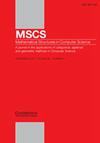A dual-context sequent calculus for the constructive modal logic S4
IF 0.9
4区 计算机科学
Q4 COMPUTER SCIENCE, THEORY & METHODS
引用次数: 0
Abstract
Abstract The proof theory of the constructive modal logic S4 (hereafter $\mathsf{CS4}$ ) has been settled since the beginning of this century by means of either standard natural deduction and sequent calculi or by the reconstruction of modal logic through hypothetical and categorical judgments à la Martin-Löf, an approach carried out by using a special kind of sequents, which keeps two separated contexts representing ordinary and enhanced hypotheses, intuitively interpreted as true and valid assumptions. These so-called dual-context sequents, originated in linear logic, are used to define a natural deduction system handling judgments of validity, truth, and possibility, resulting in a formalism equivalent to an axiomatic system for $\mathsf{CS4}$ . However, this proof-theoretical study of $\mathsf{CS4}$ lacks, to the best of our knowledge, its third fundamental constituent, namely a sequent calculus. In this paper, we define such a dual-context formalism, called ${\bf DG_{CS4}}$ , and provide detailed proofs of the admissibility for the ordinary cut rule as well as the elimination of a second cut rule, which manipulates enhanced hypotheses. Furthermore, we make available a formal verification of the equivalence of this proposal with the previously defined axiomatic and dual-context natural deduction systems for $\mathsf{CS4}$ , using the Coq proof-assistant.构造模态逻辑S4的对偶上下文序列演算
自本世纪初以来,构造型模态逻辑S4(以下简称$\mathsf{CS4}$)的证明理论要么通过标准自然演绎和序列演算,要么通过假设和范畴判断重建模态逻辑(通过使用一类特殊的序列来实现),它保留了代表普通假设和增强假设的两个分离的语境。直观地解释为真实有效的假设。这些所谓的双上下文序列,起源于线性逻辑,被用来定义一个处理有效性、真性和可能性判断的自然演绎系统,从而产生一个等价于$\mathsf{CS4}$的公理化系统的形式主义。然而,据我们所知,这个关于$\mathsf{CS4}$的证明理论研究缺少它的第三个基本组成部分,即序贯演算。在本文中,我们定义了这样一个双上下文形式,称为${\bf DG_{CS4}}$,并提供了普通切割规则的可接受性和第二切割规则的消去性的详细证明,该规则操作增强假设。此外,我们使用Coq证明助手,对该建议与先前定义的$\mathsf{CS4}$的公理化和双上下文自然演绎系统的等价性进行了形式化验证。
本文章由计算机程序翻译,如有差异,请以英文原文为准。
求助全文
约1分钟内获得全文
求助全文
来源期刊

Mathematical Structures in Computer Science
工程技术-计算机:理论方法
CiteScore
1.50
自引率
0.00%
发文量
30
审稿时长
12 months
期刊介绍:
Mathematical Structures in Computer Science is a journal of theoretical computer science which focuses on the application of ideas from the structural side of mathematics and mathematical logic to computer science. The journal aims to bridge the gap between theoretical contributions and software design, publishing original papers of a high standard and broad surveys with original perspectives in all areas of computing, provided that ideas or results from logic, algebra, geometry, category theory or other areas of logic and mathematics form a basis for the work. The journal welcomes applications to computing based on the use of specific mathematical structures (e.g. topological and order-theoretic structures) as well as on proof-theoretic notions or results.
 求助内容:
求助内容: 应助结果提醒方式:
应助结果提醒方式:


